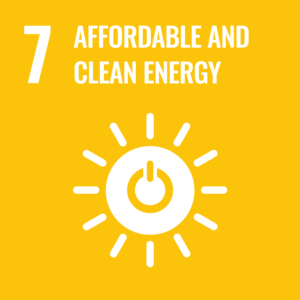SDG7: Affordable and Clean Energy and SDG13: Climate Action
The University of Northampton recognises the effects and implications energy has on the environment and climate change. That is why we are committed through our Net Zero Carbon target and low carbon energy solutions to continually develop and manage our estate in way that is consistent with SDGs 7 and 13.
Towards Affordable and Clean Energy
In 2017 the University set a target of reducing its scope 1 and 2 carbon emissions by 30% by 2020 against the baseline year of 2005/06, the action plans set up to achieve this are outlined in our Carbon Management Plan. Following the review of our plan we have achieved this target with a reduction of 36%, a total of 2,665 tonnes of carbon.
Our mission is to continue to reduce our scope 1 and 2 emissions and work towards Net Zero Carbon by 2030 as part of our commitment to the One Planet Pledge. Our Energy Policy and associated action plans contained within our Environment Management System Manual outlines our current targets, strategies and processes for a range of environmental impacts including energy and carbon reduction. This commitment to clean and affordable energy is further supported via our Responsible Investment Policy, which states the University will not invest in fossil fuel extraction or exploitation.
*36% is the total reduction in Scope 1 & 2 emissions after bill ratification.
Low Carbon Energy Source
Of the total 19,893 MWh energy consumed during 2020/21, 59% of this was generated from low carbon sources. This includes energy produced by our biomass boiler, solar PV panels and renewable electricity from our provider. The biomass boiler produced 2,241 MWh of heat energy during 2020/21, contributing 34 tonnes of CO2e to our carbon footprint. This saved 411 tonnes of CO2e if natural gas was used for this consumption.
UON is on a ‘100% Renewables for Business’ green tariff for our electricity supply. We claim REGO (Renewable Energy Guarantees Origin) certificates from our provider for this supply across the estate. The final site was moved on to this tariff January 2021, meaning 97% of our electricity consumption came from renewable sources.
Our Energy Report provides full details of the University’s total energy consumption and breakdown of our low carbon and renewable energy sources, both on and off campus for the academic year 2020/21.
Our recent Green Award from Investors in Environment highlighted our excellent reductions in electricity, water, waste and carbon particularly the processes and Action Plans we have in place for measuring and monitoring our impact across a range of sustainability aspects. Further recognition of the University’s commitment to clean energy was highlighted in a recent U Switch study where the University ranked in the top tier of 105 universities tested, demonstrating that the university is doing better than 50% of other UK universities.
The utilisation of the MeterWeb2 software and feedback into our Building Management System enables the University to spot where energy wastage maybe occurring enabling a better understanding of our energy consumption and potential savings to be made across the estate. Examples of energy saving measures are the recent roll out of LED lighting with light sensors. This and future construction and refurbishment projects follow our Sustainable Construction Policy.

